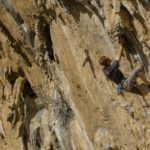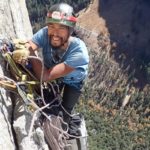 I recently had the pleasure of speaking with Sonnie Trotter: easily one of the world’s most accomplished climbers. Best known for his intrepid ascent of Squamish’s Cobra Crack (5.14a/b), this Canadian climber—and now father—has embodied a deep passion for everything climbing since first touching rock at age 16. Sonnie’s immense talent manifested less than 2 years later, when he began ticking off 5.14s in Colorado.
I recently had the pleasure of speaking with Sonnie Trotter: easily one of the world’s most accomplished climbers. Best known for his intrepid ascent of Squamish’s Cobra Crack (5.14a/b), this Canadian climber—and now father—has embodied a deep passion for everything climbing since first touching rock at age 16. Sonnie’s immense talent manifested less than 2 years later, when he began ticking off 5.14s in Colorado.
Luckily for all of us, Sonnie has and continues to inspire by exploring the depths of climbing in Canada and across the globe. Hear his insights on life and climbing:
You started climbing at 16 and quickly began crushing. Who were the people and factors that made pursuing the sport of climbing possible?
A climbing gym opened up a five-minute bike ride from my house, which made it immediately accessible to me. Looking back, I was fortunate to have done a lot of gymnastics as a youngster, because nowadays, starting to climb at 16 is pretty late. There are 10 year-olds at the gym that I can barely keep up with now!
I was also lucky in that my parents had me involved in a lot of different sports and I think that helped me gain a strong sense of body awareness. My parents are also very encouraging people, so even if I didn’t do well, they always told me that I did, which helped me develop quite a bit of confidence as a kid.
I was also completely obsessed with climbing. I think that has more to do with it than anything else. At first I wasn’t a good climber at all, but I really wanted to climb. I had to break through mental barriers to get over the fear, but most importantly I was just obsessed. I don’t know what it was. Sometimes I went five, six, or even seven days a week after school. I think I’m really lucky that my body responded well. I would climb until the point of complete exhaustion and then wake up the next morning in so much pain and think, “there’s no way I’m climbing today …” but sure enough by 4 o’clock the next day I would go climbing again.
Related: The Ultimate Campus Board Training Guide, featuring Sonnie Trotter
How did you make the commitment to rock climbing professionally?
I remember asking Lynn Hill the same question when I was 19. I asked her, “Was it a conscious decision to become a professional climber?” At that time there were very few—it didn’t really exist other than Lynn who had made it into a career. So I actually didn’t think it was ever going to be a career—I just loved it so much.
I kept putting school off and saying “oh just one more year, just one more year,” but every year that I pushed it off I kept getting better at climbing and making more friends and contacts in the industry. My climbing connections just continued growing and I fell in love with the community at large. I became exposed to people making a career out of it—whether they were writing, taking photos, or whatever else—and my network grew to the point where I started getting rewarded for my commitment to climbing. It was never a conscious decision, I was just climbing all of the time.
I lived out of the back of my truck for years … I was totally committed. When I was 17, I was trained as a carpenter, and I used those skills to work and get enough money to buy my truck and pay for my first trip to Spain so that I could climb and travel. I just wanted to travel the world and climb rocks all of the time. I was entirely committed to climbing as much as humanly possible.

You now have a new member in your family—your son, Tatum. How, if so, has that changed your perception of risk when it comes to climbing?
For me it changed things, for sure. Nowadays, I definitely like to take risks that I have a say in or some control over. If something goes wrong, I can blame myself. If I’m in a risky decision, like say in the alpine environment, when I make a bad decision due to rock fall hazard or things of that nature, I get pretty frustrated with myself. I’m definitely starting to think more about controlled risk. I still want to feel the excitement of taking risks, but I’m less inclined to leave it up to fate.
I’ve always wanted to have a family ever since I was young. My wife and I have been together for eight years and we have a little one year-old, and life is so perfect. I’ve never been so fulfilled in my life. As a result, I definitely think more about my risk taking. I still want a piece of it, but I’m just going about it a different way.
Related: Alex Honnold, A Question of Risk

Do you have any major projects lined up?
I’ve got a lot, actually. I have a couple more projects in Squamish that I’ve found and am working on, but I’m not actually a hundred percent sure that I can do them. I dabble in a lot and wherever my inspiration takes me that season is what I’ll do. I’ve got projects in the Rockies to do, more in the alpine environment, and I’ve got a couple of cracks in Squamish that are stacked 5.14s—so essentially a multi-pitch Cobra Crack.
The caliber of climbers is getting so much stronger these days, and with so many hungry climbers out there, it wouldn’t surprise me if I found out in July that the project I’ve been working on has been snagged by somebody else. But, it’s alright—I’ve always got a few more in my back pocket. I’m also excited to be in the big mountains; to branch out a little bit more and do harder routes in bigger peaks.
Related: Climbing Destination Guide: Squamish, BC

What do you think is the biggest misconception about the lifestyle of professional climbers?
That it’s easy. From the outside I think it looks really easy. It seems like [professional climbers] just travel around, get to go wherever they want, get to climb whatever they want, whenever they want, but it’s really the background that got them there. It’s the struggle. It’s a competitive world and there’s a huge amount of struggle that people go through to get where they want—and that’s in life in general. There’s the occasional overnight success, but it’s a misconception that it comes easy. There’s so much work that happens to get there.
Even Chris [Sharma]. It seems that everything comes easy to him. But I grew up climbing with him, and he really just tried way harder than everybody else. He was the first one there and last one to leave. He climbed harder and longer than everyone else did. He would forget to eat he was so enthralled with climbing. He’s extremely talented, but he’s also put in a tremendous amount of hours of work to get where he is.
There are so many excited young climbers out there. If an ambitious, stoked 16 year-old came up to you and said they wanted to quit school to climb for the rest of their life—what would you tell them?
Oh man. What if that was my kid?! Hm … I think it’s kind of cliché to say, but I think someone’s drive or passion overrides everything.
If you’re passionate about school, then that’s great. If you’re passionate about some place that school can help take you, then that’s great. I also think that being an athlete today is harder than ever, and that being in school for longer is better because climbing, and all sports for that matter, are getting to a level of professionalism that requires you to be able to manage yourself, do research, and find answers for yourself—which are skills that school gives you. If you don’t develop those skills, you might be the greatest athlete who no one’s ever heard of because you can’t back it up with a level of professionalism. People want to work with people that have developed these skills. School can develop confidence in that.
But with all that being said, I think that passion overrides everything. If you’re hellbent on becoming the next Jimmy Chin or whoever, you can probably do it. But you really have to ask yourself, if you have it in you. You have to ask yourself that question everyday. I consider myself lucky because I was so in love with climbing. People thought it was a sacrifice for me to be living in my truck, but I wouldn’t trade it for anything the world. Not because I wanted it to take me somewhere, but because it put me where I wanted to be in the moment. I wanted to be rock climbing and I did whatever I had to do to make that happen. I think it’s about passion and living it day-to-day.
In life, one thing I’ve learned is that people want to help people who are driven, because they get positive energy from them. I think I got sponsored once people realized I was going to do it no matter what—whether I had help or not. I was going to find a way to climb. I was 120,000% committed. Once people feed off of that energy, it’s easier to get the momentum you need.
It’s cliché, but again, passion is the number one factor in determining one’s success. I define success as fulfillment. Happiness is one thing, but to be truly fulfilled is another. It takes time, but if you get to a point where you love where you live, love who you’re surrounded by, and love what you do every day—those three things—then that’s the ultimate in life.

We’re psyched to follow your successes into the future, Sonnie. Keep crushing in both climbing and in life!
Sonnie Trotter is a professional climber sponsored by Patagonia, Five Ten, Black Diamond, and Sterling Rope. To learn more about him, explore his website.








